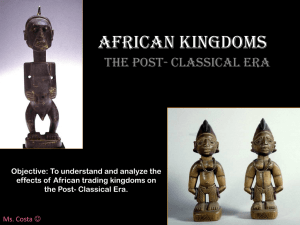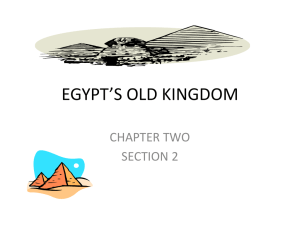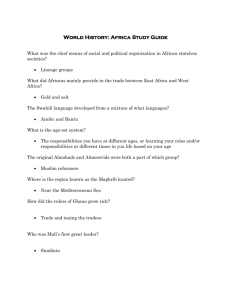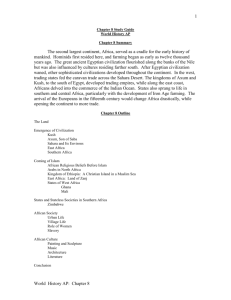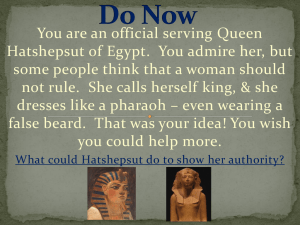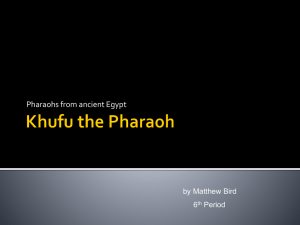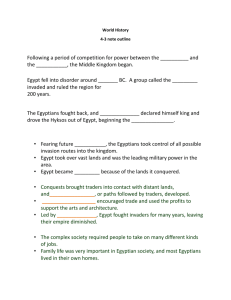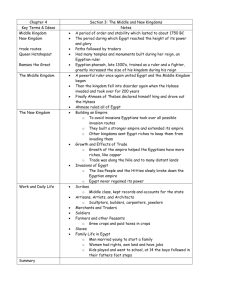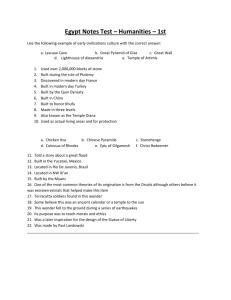Political Development In Historic Africa
advertisement
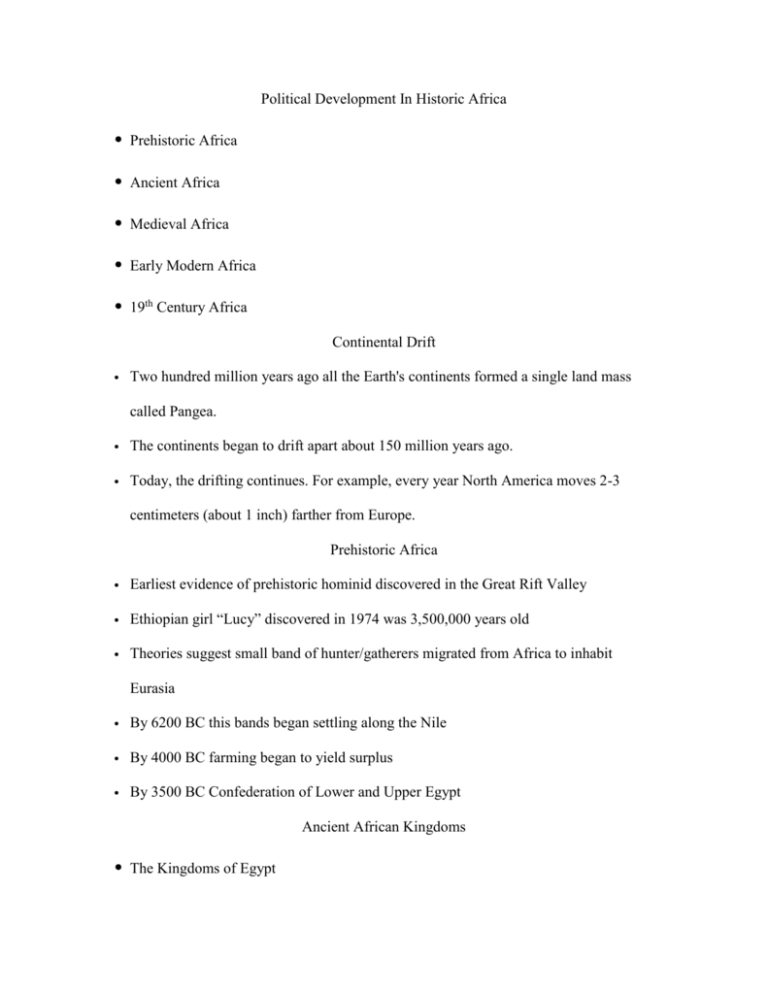
Political Development In Historic Africa • Prehistoric Africa • Ancient Africa • Medieval Africa • Early Modern Africa • 19th Century Africa Continental Drift • Two hundred million years ago all the Earth's continents formed a single land mass called Pangea. • The continents began to drift apart about 150 million years ago. • Today, the drifting continues. For example, every year North America moves 2-3 centimeters (about 1 inch) farther from Europe. Prehistoric Africa • Earliest evidence of prehistoric hominid discovered in the Great Rift Valley • Ethiopian girl “Lucy” discovered in 1974 was 3,500,000 years old • Theories suggest small band of hunter/gatherers migrated from Africa to inhabit Eurasia • By 6200 BC this bands began settling along the Nile • By 4000 BC farming began to yield surplus • By 3500 BC Confederation of Lower and Upper Egypt Ancient African Kingdoms • The Kingdoms of Egypt • Axum The Kingdoms Of Egypt • Egypt – Earliest center of food production – Ancient Egypt governed by pharaohs grouped into 30 dynasties (3100 B.C. – 332 B.C.) – Relied on large government and lived in opulence at the expense of the peasants – Farming drive economic prosperity with surplus going to the king – Power waned and fell victim to invaders by 1000 B.C. • The Old Kingdom (3100 – 2180 BC) – Earliest large-scale political economy – Ruled by Pharaohs • – Identified with the Gods Horus and Osiris The Great Pyramid at Giza (2600 BC) • Built for Khufu • 2.5 million 5,000 lb blocks of limestone – Kingdom fell after loss of central authority – Began First Intermediate Period (2180-2080 BC) • The Middle Kingdom (2080 - 1640 BC) – Living Pharaohs no longer considered divine – Commerce and Construction revived – Conquered by Hyksos • The New Kingdom (1570-1090 BC) – Began expanding – Became earliest multicultural empire in Africa – King Tutankhamen ruled only a short while • Famous because of tomb discovered in Valley of the Kings in 1922 by Howard Carter • Many people associated with the excavation died suddenly, fueling rumors of a curse • Roman Imperial Rule (30 BC) – Queen Cleopatra negotiated with Roman rulers to keep political autonomy • Julius Caesar and Marc Anthony • She committed suicide to save face – Rome imposed law and religion until the fourth century Medieval Africa Medieval African Kingdom/Empires • Axum • Ethiopia • Ghana • Mali • Kongo • Zimbabwe Axum • Axum (200 b.c. -700 a.d.) – Modern day Ethiopia – One of the earliest Christian kingdoms – Obelisks are considered buy some to be one of the “Wonders of the World” Medieval Africa • The Age of Islam (640 – 1600) – Expanded from Mecca – Inspired by the Prophet Mohammed, conquered and converted most of Egypt and Maghreb – Maghreb is modern North African countries of Libya, Morocco, Mauritania, Algeria, and Tunisia Age of Islam • Originated in 7th century Arabia – Muhammed assertion of divine revelations – Messages written in Arabic in the Qur’an – After the death of Mohammed, khalifa’s served as political leaders – Children required to memorize the Qur’an by heart – Interpretation of laws varies widely • Sharia law • Took two basic routes – Northern Africa where Arabs established themselves as ruling elite – Sub-Saharan Africa where Muslim traders introduced Islam living in commercial enclaves – Expansion was accompanied by Arabization – Conquered Northern Africa by mid 9th Century – Conversion met varying levels of acceptance and resistance – Altered relations between state, religion and society – Ottoman Empire united much of north Africa • Early on, local rulers kept Muslim merchants in exclaves and many African did not come into contact with Muslims • Slowly, local merchants were converted • Kingdom of Mali was first to truly embrace Islam – Mansa Musa made hajj to Mecca – Timbuktu became a center for religious learning • Islam transformed African societies • Arabization occurred in the north, but was limited south of the Sahara • Europeans were able to conquer because Muslims were not politically, religiously or economically united Ethiopia • Evolved out of fragmented ancient Axum • Unification of various kings and Christian monasteries • Claims lineage from Israel's King Solomon and the Queen of Sheba • Held ties with Egyptian Coptic Christian • Ark of the Covenant Kingdoms Of West Africa – Ghana (700 – 1076 AD) – Mali (1200-1430 AD) – Kingdoms eventually fragmented Ghana • Strategically located—able to control the lucrative trans-Saharan trade – Built large armies Mali • Reputation of a strong economy (commerce/farming) – Used Islam to create social cohesion – Defeated by Songhai Kingdom – Description of Sudan as a large area and not the country today Early Modern Africa • International Slave Trade (1140 – 1870) – European powers built forts of the west coast of Africa that facilitated the slave trade – Europeans traded guns for slaves – Middle Passage • Route that took slaves to the Americas Nineteenth Century Africa • Early modern African states continued to develop and trade between coastal regions and the interior • Confederations establish based along commercial, religious and military lines • Ended with the European “Scramble for Africa” (1880 – 1900) • North Africa (1800 – 1900) – Egypt • Muhammad Ali (1805 – 1848) • Modernized Egypt by establishing a a national army, colleges, secular schools, and factories – Algeria • Colonized by France in 1830 • West Africa – By 1800, British were seizing slave ships and returning them to Sierra Leone – Liberia established in 1847 • Freed African American slaves European “Scramble for Africa – Berlin Africa Conference of 1884-1885 – Official partitioning occurred by participants from Germany, France, Britain, Belgium, Spain, Italy, Germany and Portugal • East Africa – 19th Century Developments – Demand for resources increased need for labor – Egypt grew to be a powerful imperial Muslim state – Omani sultans used Zanzibar to run plantations and control the Indian Ocean trade on the Swahili coast – After the partitioning in the late 19th Century, European relationships with Muslim elites were complicated – Muslims resisted expansion – Ethiopia • Menelik II (1889-1912) – Battle of Adwa – Modernized Ethiopia
